Top 20 Jazz Albums of 2016
Tuesday, December 13, 2016
Has Stuart Nicholson got a crystal ball? Back in the April issue in the interview with Tim Garland talking about his new album One, he nailed it with the closing sentence: “It’s a truly memorable album that’s head and shoulders above any other British jazz recording of the last couple of decades.

” As word spread, ears perked up and, come this year’s annual Jazzwise Album of the Year Critics Poll, Nicholson clearly wasn’t the only believer. Garland’s One racked up more points than any other release of the past 12 months. And deservedly so. This modest but distinctly world class saxophonist, composer and bandleader has been acknowledged in America by a Grammy Award and lengthy tours with Chick Corea and Joe Locke, but previously has perhaps never quite received his just recognition in the UK, until now. Jon Newey
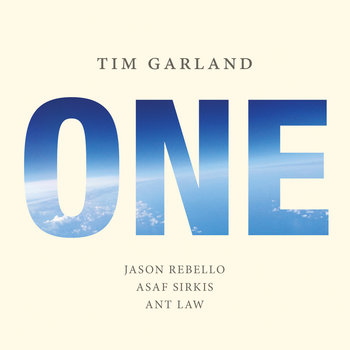 Tim Garland One
Tim Garland One
Edition
A new group and a new beginning for Tim Garland in what is the finest album by a British jazz musician for quite some while. First, a word about Garland’s virtuoso playing on tenor and soprano saxes, which has reached a level of excellence and maturity that is truly world class. On soprano he offers an evenness of tonal density throughout the registers of the instrument; nothing sounds pinched or forced, and while his articulation is precise and accurate, each note rings through with remarkable clarity even in legato passages. Expressing himself in melodic, rather than pattern-based, improvisation, his playing is virtually cliché free, often using ‘compositional’ devices such as the use of the rising line to create a feeling of tension. This feeling is also reinforced by the occasional use of side-slipping.
On ‘Bright New Year’ he plays with such freedom within form it represents a striking example of exemplary contemporary jazz improvisation. Equally, on ‘Colours of Night’ he exhibits a degree of both technique and taste (the two rarely go hand in hand) that few in jazz can equal. On tenor saxophone he retains this melodic lucidity, evenness of tonal density (from bell tones to false-fingered high notes at the extreme of the saxophone’s range) and on ‘The Eternal Greeting’ he gives a virtual master class in manipulating the rising line to potent and dramatic effect.
Garland has developed the story-telling privilege that is the province of the great jazz improvisers – a Garland solo is not a breakneck bunch of notes thrown at listeners for them to try and make sense of, but solos of architectonic construction that have a beginning, a middle and an end and take the listener on an absorbing journey. But even mastery of your chosen instrument at the level Garland has achieved (and which few in jazz can match) is not enough in jazz today. The challenge is to create an effective context to give expression to the improvisers art. Here again Garland scores, with an ensemble that has done away with the traditional piano-bass-drums role of the jazz rhythm section and placed the rhythmic role in the hands of keyboards, Ant Law’s eight-string guitar which covers the bass notes and Asaf Sirkis’ innovative drums/ percussion. This fresh approach – a development of the rhythmic approach adopted by his previous group Lighthouse – is integral to Garland’s compositional ingenuity with pieces written in a way that shows this unusual approach to rhythm to best advantage. Here, Asaf Sirkis emerges as an unsung hero with a performance that is surely world class. Rebello and Law are exemplary too, offering maturity and flair in both ensemble and solo that contribute significantly in making this album special. Stuart Nicholson
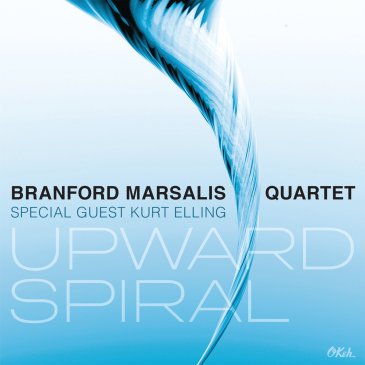 Branford Marsalis Quartet with Kurt Elling Upward Spiral
Branford Marsalis Quartet with Kurt Elling Upward Spiral
OKeh
It is quite remarkable how at home Kurt Elling makes himself in the Branford Marsalis Quartet, so much so that Marsalis later said he felt the singer was a natural fifth member of the group. Although Elling admitted to a little bit of nervous tension prior to the session – and why not, the group has been around since 1996 with very few changes in personnel and has established a tight little musical world of their own – the singer actually comes up with one of his best performances on record.
Working out on a collection of handpicked songs, most of which even the most diehard jazz fan will not have heard before, Marsalis’ expanded group comes up with a real ‘album’ experience, with a performance arc that leads from one song into the next without disjunction that together create an absorbing musical journey. Highlights include ‘I’m a Fool to Want You’, a duet between singer and saxophonist and Sting’s ‘Practical Arrangement’, while Elling makes a fine job of Sonny Rollins’ ‘Doxy’ using Mark Murphy’s lyrics. Stuart Nicholson
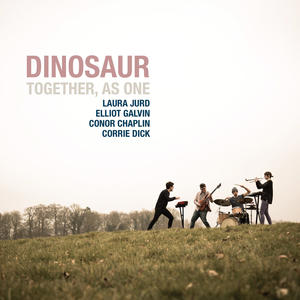 Dinosaur Together, As One
Dinosaur Together, As One
Edition
Electric Miles is still terra incognita for some; the point he left jazz, or went somehow mad. Bitches Brew’s brooding, splintered paranoia isn’t on Laura Jurd’s agenda. The abrasive tone of Elliot Galvin’s Fender Rhodes, though, and the way Jurd’s trumpet wraps mournful tendrils around the bassline on ‘Awakening’, after distantly roaring as if across a primeval forest clearing, inevitably recall Corea and company roughly sculpting a new sonic world. Rechristening her regular quartet Dinosaur gave fair notice of their thrilling power live, where they’re as likely to fly into soulful Sly Stone or JB’s terrain.
Their debut album, though, is a considered studio production, with a sense of space and shape. Though all Jurd compositions, Galvin often takes the lead. Switching to Hammond for the slow-rolling funk of ‘Extinct’, he’s back on Fender for progsoul riffing on ‘Primordial’ which recalls Van der Graaf Generator’s Hugh Banton. Then he slips below the tune’s surface on Hammond, becoming its smooth engine as Jurd sunnily soars, and Dinosaur stretch and strut. Jurd also offers warm balm on ‘Robin’. Her band’s focused joy replaces the darker eddies Miles traversed. Nick Hasted
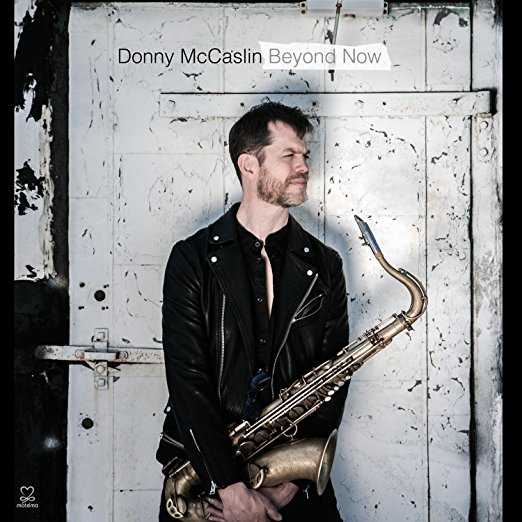 Donny McCaslin Beyond Now
Donny McCaslin Beyond Now
Motéma
In the months following David Bowie’s death, musical tributes started to pour in, among them the disastrous Bowie Prom in September at the Royal Albert Hall. So when the real thing comes along you know it’s time to rejoice. Beyond Now is the outstanding new recording by the New York-based saxophonist Donny McCaslin with the same line-up that appeared on Bowie’s swansong Blackstar. It’s an exhilarating, heart-stirring hymn to a rock’n’roll icon, a rare breed of mega star who absorbed jazz undiluted into his genre-bending art pop aesthetic. It’s a love letter too, to someone who had a huge impact on these jazz musicians as both artist and human being.
From the epic dreamy pop-jazz soundscapes of ‘Bright Abyss’ and ‘Remain’, to the hurtling punk jazz of ‘Faceplant’ and opener ‘Shake Loose’, Lindner’s spiky synth-surge, the Guiliana-Lefebvre grooving juggernaut and McCaslin’s thrillingly ballistic sax improv make for a decidedly diverse and contemporary-sounding offering packing plenty of heat. Elsewhere, eerily inventive covers of the Bowie-Eno ‘A Small Plot of Land’ (vocals by Jeff Taylor) and Low period instrumental ‘Warszawa’ come in for tasteful treatment too. If a rock star has come up with one of the strongest jazz-infused releases of the year, Beyond Now is right up there with it. Selwyn Harris
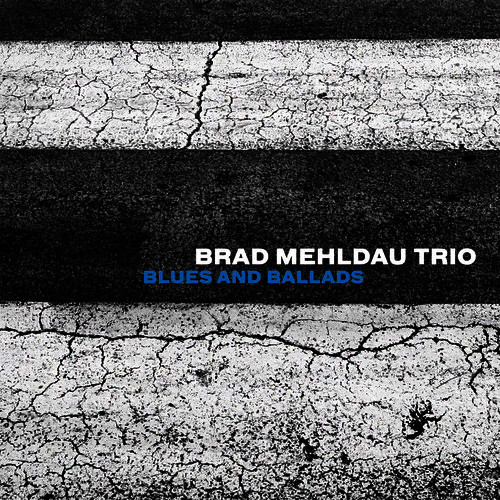 Brad Mehldau Ballads and Blues
Brad Mehldau Ballads and Blues
Nonesuch
Following the epic, turbo-charged one man showcase on the retrospective 10 Years Solo Live and the exhilarating contemporary prog electronica fireworks of his duo Mehliana’s Taming the Dragon, Brad Mehldau returns to the more intimate format of the acoustic piano trio on which he initially built his inimitable reputation.
Blues and Ballads picks up essentially where Where Do You Start? in 2012 left off, with an entire covers collection featuring the usual suspects from The Beatles’ ‘And I Love Her’ (also featured on 10 Years Solo Live) and Paul McCartney’s ‘My Valentine’ from 2012, through to an exquisitely expressive take on Buddy Johnson’s widely-covered sleepy blues standard ‘Since I Fell for You’. More highlights include his rendition of the hip Largo producer Jon Brion’s sweet miniature ‘Little Person’ taken from his score to the film Synecdoche, New York and the sideways swing of the Charlie Parker blues ‘Cheryl’. Mehldau’s unique craftsmanship is undisputed but he also brings a real emotional depth to Blues and Ballads. Selwyn Harris
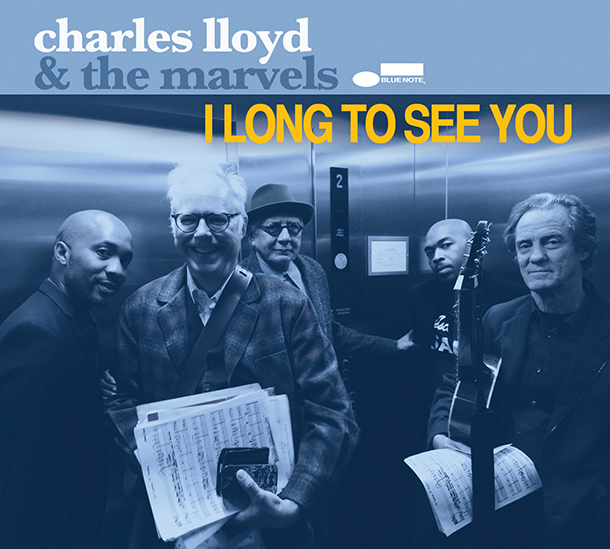 Charles Lloyd & The Marvels I Long To See You
Charles Lloyd & The Marvels I Long To See You
Blue Note
I Long to See You marks a change of pace for Charles Lloyd; there isn’t anything quite like it in his discography since this an album of country influenced mood music. He returns to two of his originals from the 1960s in ‘Sombrero Sam’ and ‘Of Course, Of Course’, to his ECM years with ‘La Llorona’ and contributes a fresh original in ‘Barch Lamsel’, the album highlight among a repertoire that ranges far and wide to variable effect.
Bob Dylan’s ‘Masters of War’ could have been successfully edited to half its length, for example, in its present form an amiable noodle, and this seems to be the destiny of several songs. Part of the problem is the laid back playing of Bill Frisell, who sounds as if he could barely get out of bed in the morning. Lloyd plays well, but he does need someone to bounce off. There are nice moments: ‘Abide With Me’ would please the Anfield faithful, ‘All My Trials’ has elegance as long as Lloyd is at the microphone, while Willie Nelson’s ‘Last Night I Had the Strangest Dream’ somehow works in the context of the album. Dear old Norah Jones – she who bank rolled the survival of the Blue Note label – is unmistakably Norah, if you like that sort of thing. Great for iPod listening since this functions well as undemanding background music. Stuart Nicholson
 EST Symphony EST Symphony
EST Symphony EST Symphony
ACT
It would have been Esbjörn Svensson’s next project. Classically trained at Stockholm’s Royal College of Music, the work of Bach, Mozart, Beethoven, Debussy and Shostakovich was close to his heart (I once heard him warming up for the Tuesday Wonderland recording session in the Atlantis Studio in Stockholm with Shostakovitch’s ‘Piano Concerto No. 1 Op. 35’), it was perhaps inevitable he would hanker to hear his music performed by a symphony orchestra. Sadly, it was not to be. However, this posthumous realisation of his ambition by his former colleagues in EST, Dan Berglund and Magnus Öström, and produced by EST’s former manager Burkhard Hopper is an impressive piece of music from whatever end of the musical spectrum you choose to gaze at it and surely something that would have given him a kick.
Arranged and adapted for symphony orchestra by Hans Ek, his writing has succeeded in capturing the emotionally engaging element of Svensson’s playing that appealed to those both inside and outside the jazz constituency. He has even managed to evoke the subtle electronics that Svensson occasionally used, creating an ambient haze of strings to surround the melody. In 2003, Svensson himself wrote three arrangements (Dan Berglund three also) for a project with 16 strings at Jazz Baltica in 2003, and one of Svensson’s arrangements, ‘Dodge the Dodo’, is enlarged by Ek here. On ‘When God Created the Coffee Break’ Ek has inserted a Svensson solo transcribed from Live in Hamburg for orchestra and it is fascinating how Svensson’s improvisation sounds like a composition in its own right and highlights how he actually seems to ‘play’ silence, which left windows through which we could enter his musical world. ‘The EST Prelude’ that opens the album contains another orchestrated session solo, and hooks you right from the beginning. Stuart Nicholson
 Impossible Gentlemen Let’s Get Deluxe
Impossible Gentlemen Let’s Get Deluxe
Basho
The Anglo-American supergroup The Impossible Gentlemen’s third CD on Basho Records hits you right between the eyes with its mix of seductively sing-a-long melodies, classy arrangements and tastefully succinct improvisation. The recording sees an extension of the instrumental palette with the addition of woodwind all-rounder Iain Dixon and Gwilym Simcock at his most versatile on various keyboards and tuned percussion instruments, as well as acoustic piano. The extra layer of sound is subtly and effectively woven into the arrangements as opposed to providing background fill.
The Metheny Group-like opening title track’s memorable hook has the new full-time bassist and longtime Pat Metheny Group member Steve Rodby laying down one of the most deliciously snaky electric funk bass lines you’ll hear for a long time. There are echoes of Chick Corea and Return to Forever on ‘A Fedora for Dora’ and it’s not hard to imagine Donald Fagen singing raspy vocals over the excellent ballad ‘It Could Have Been A Simple Goodbye’, the co-writers Simcock and Walker’s tribute to pianist John Taylor.
The Impossible Gentlemen might not feature too high on the hipster scale compared to an electric Brit jazz ensemble such as Troyka but the Sco-influenced grunge-funk of ‘Dog Time’ with growling dog samples is something that the aforementioned trio might well have been happy to come up with. ‘Terrace Legend’, about an unlikely Stoke City FC kit man, has a Zawinul-esque African-flecked groove while the contrasting closing piece ‘Speak To Me Of Home’ is reminiscent of Simcock’s sometime pastoral chamber trio Acoustic Triangle, with Dixon taking his only solo on soprano sax very well. It’s a brighter, more uplifting and assertive album compared with the previous two, but just as sophisticated. Selwyn Harris
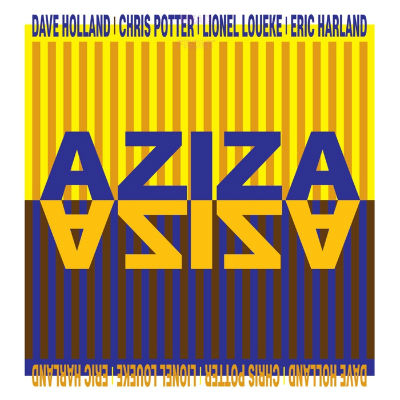 Aziza Aziza
Aziza Aziza
Dare2
The double bass jazz maestro Dave Holland turned 70 in October but shows no signs of slowing down. In fact, he seems to have turned up a gear or two instead; his recent work in education, live touring schedule and studio recordings bear that out. Last year saw him record an intimate straightahead duo album The Art of Conversation with Kenny Barron and before that, one of the best jazz recordings of 2013 with his new ‘electric’ fusion group Prism.
The Aziza collective grew out of discussions between Holland and Chris Potter, an influential saxophone musical partner of his since the 1990s. As with Prism, the electric guitar is a key building block of the ensemble but this time it’s the Benin-born Lionel Loueke, another pedigree individualist, who applies his unique mix of African folk music, contemporary electric sonic effects and jazz to the recording. His acid funk composition ‘Aziza Dance’ has a brilliantly shaped solo with tasteful keytar-like sound effects, somewhat reminiscent of the pianist Hiromi. Chris Potter’s lilting folky Caribbean ‘Summer 15’ has Loueke sounding more like an African Pat Metheny and the saxophonist’s eastern-flavoured ‘Blue Sufi’ really hits the spot with its 1970s-era Chico Hamilton-ish latin fusion sound and Loueke’s driving psych jazz-rock guitar. It hasn’t quite the same sense of adventure or raw group cohesion as his Prism CD, but it’s top level groove-jazz playing all the same. Selwyn Harris
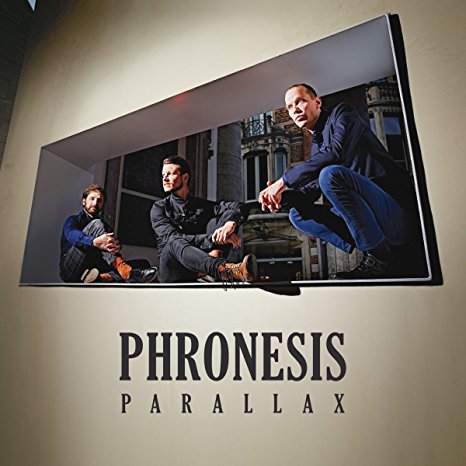 Phronesis Parallax
Phronesis Parallax
Edition
Ten years into their life as an increasingly tight-knit trio and it’s perhaps no surprise that Phronesis have named their latest album after an “apparent displacement of an observed object due to a change in the position of the observer,” or Parallax. Indeed, to an outside observer they appear to be at the top of their game, rising to the summit of the European piano trio pile thanks to consistently incendiary live shows and a string of equally compelling (sometimes live) recordings. Yet it’s tough at the top and the alternative perspective offered up on Parallax is of a band who, far from resting on their laurels, burst out of the gate with a set of nine polished yet propulsive new tunes recorded in a single day at the hallowed Abbey Road Studios. Having been at one of their adrenalin soaked gigs – one of three recorded – that resulted in their previous release, Life To Everything, this writer can attest to the near telepathic empathy that exists between bassist Høiby, pianist Neame and drummer Eger when the red recording light is on. Theirs is a hive-mind that thinks as one and navigates the trickiest of time signatures, displaced beats, lurching unison riffs or swerving solos with ease.
The good news with Parallax is that the move to a studio environment has done nothing to dampen the zeal with which they tackle the music, this in part thanks to the band playing the entire album beginning to end three times and then selecting the best takes for the final release. This has brought a strong narrative arc to the songs, with opener ‘67000 MPH’ careering along with freewheeling frenetic finesse. This is among several contrapuntal dust-ups across the set including Høiby’s atypical ‘Stillness’, Anton Eger’s karate-chopping drum capers on ‘Manioc Maniac’, and the hypnotic drive of closer ‘Rabat’. More meditative pieces include Neame’s chiming ‘Kite for Seamus’ and Høiby’s midnight mood on ‘A Silver Moon’. Through it all the band’s willingness to defer individual showboating for a combined sonic attention to detail has rarely sounded better: solos weave into a continuum of sound, never sacrificing a cheap technical thrill for a substantial musical statement. Far from bookending 10 highly successful years together, Parallax opens a new chapter full of musical riches from this most complete and compelling of bands.
 Kit Downes & Tom Challenger Vyamanikal
Kit Downes & Tom Challenger Vyamanikal
Slip
The idea of a ‘genius loci’, or spirit of place, permeates these recordings of church organ, saxophone and indomitable avian choirs. Keyboardist Kit Downes and saxophonist Tom Challenger are documented here locked deep in conversation with their surroundings – the churches of the Suffolk countryside – while nature, in turn, reciprocates with plenty of bonus backchat. The two elements settle on an unfolding habitual consensus detailed in moans and whistles. Cavernous drones – not unlike those pursued by Pauline Oliveros with her Deep Listening Band – resonate around the cloisters before the calming chirrups of birdsong break through (as on ‘Jyotir), slowing the pace down to Béla Tarr-like cinematic speeds (‘Maar-ikar’).
There’s a real sense that this meditative music is being borne on the breeze, riding a carousel of glorious vectors above our heads. While writers such as Iain Sinclair and WG Sebald have previously sought to map out their own personal psychogeographies of England, Kit Downes and Tom Challenger have created something far more universal, a democratic tone poem, where every imagination is invited to chart its own Suffolk landscape.
 Jazz At Lincoln Centre Live In Cuba
Jazz At Lincoln Centre Live In Cuba
Blue Engine
The stated mission of the Jazz at LCO is “to entertain, enrich and expand a global community for jazz through performance, education and advocacy”. These very worthwhile if slightly high-flown aims, apparent in the orchestra’s recent UK visit with its concentration on support for young players amidst its more specific concert commitments, were also carried forward when the orchestra visited Cuba in 2010, this very spirited double-album a record of their weeklong sojourn in Havana.
It took President Obama’s lifting of travel restrictions between the US and Cuba to get them there. Once in place, the band spread the word all over the city, working again with youngsters and performing a series of latin-flavoured pieces by band members, a selection of Ellingtonia, a hint of New Orleans and a bow to the innovations of Dizzy Gillespie with a nine-minute version of ‘Things to Come’, taken a tad too fast, all caught here. Much is made in the lengthy booklet note of the common musical heritage between the two communities, the evident enthusiasm of these local audiences adding support to the theory. Or maybe they’d just been starved of this righteous stuff. They clearly approved of Henriquez’s ‘2/3’s Adventure’ with its move into guajira rhythm, with Printup playing high while Irby’s bluesy arrangement of ‘Baa Baa Black Sheep’ may have surprised them but Rampton’s extended solo is a joy, as is Irby’s poised alto. Wynton’s ‘Vitoria Suite’ recalled his Ellington debt as does ‘Inaki’s’ Decision’, his conversational trumpet foregrounded. Thereafter, the incorporation of local artists adds spice where necessary. Otherwise, there’s a ton of music here, a vivid advertisement for the continuing vitality of LCJO jazz, catholic in its choices, eclectic in the variety of influences on offer but simultaneously joyous and celebratory, too. Temperley is magnificent on ‘Sunset and the Mocking Bird’, Crenshaw proves to be a pretty effective blues shouter on ‘I Left My Baby’ and Wynton solos at length throughout. What a mission and what an outcome! Peter Vacher
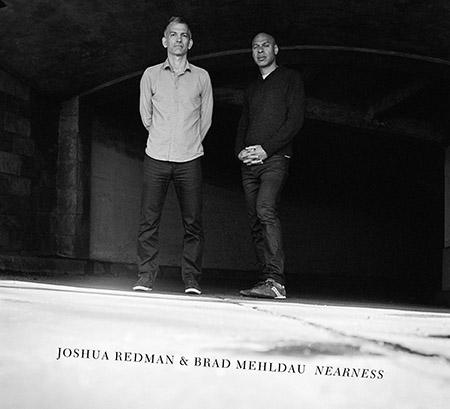 Joshua Redman and Brad Mehldau Nearness
Joshua Redman and Brad Mehldau Nearness
Nonesuch
The influential contemporary pianist and saxophonist’s musical relationship goes back to the early 1990s. It was then that a fledgling Brad Mehldau, who was fresh out of New York’s New School, got his first break touring and recording with a trend-setting Redman band that featured Christian McBride and Brian Blade. They’ve recorded infrequently since; Redman was a notable contributor to Mehldau’s 2010 Highway Rider and Mehldau on Redman’s sax-and-strings album Walking Shadows in 2013. But they did get to perform in a more intimate duo setting as well, first in 2008 and then for a run of concerts in Europe in 2011, a selection of which make up the tracklist on this outstanding new release Nearness, their first as a duo.
The opening Charlie Parker/Benny Harris’ ‘Ornithology’ thunders along at rocket pace but unlike other contemporary jazz interpretations of bebop standards, the tune is reinvigorated rather than violated. The pair’s contrapuntal to and fro-ing is breathtaking in its heated exuberance and sharp tiki-taka exchanges, brilliantly and unpredictably resolving what seems to be musical dead-ends. On another bebop classic, Thelonious Monk’s ‘In Walked Bud’, Mehldau’s playful one-handed motifs and inventive re-harmonising underscores Redman’s shapely swinging bop narrative. The pianist’s Beatles-ish ‘Always August’ has a deeper bluesy intimacy in this setting compared to the version on Highway Rider. The less buoyant ‘Mehlsancoly Mood’ is Redman’s punning homage to his partner who’s in accompanying mode, the descending bass movement reminiscent of a song by Nick Drake, a Mehldau favourite. Redman’s luxurious, smoky tones on the title track, ‘Nearness of You’, echoes the old swing sax masters while a 15-minute near symphonic version of Mehldau’s ‘Old West’ demonstrates the pianist’s attachments to the ‘romantic’ classical era. There’s none of the boring self-indulgent battle of wits or in-jokes that can occur when jazz superstars decide to have a matey get together; it’s all about serving the song and playing in the moment. Selwyn Harris
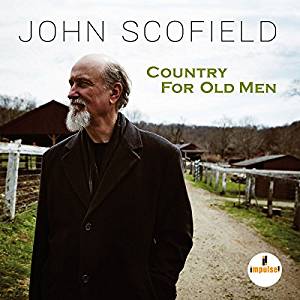 John Scofield Country For Old Men
John Scofield Country For Old Men
Impulse!
I cannot begin to comprehend how you deal with the death of a son. For over two years the Scofield family and friends have journeyed the earth fulfilling their son’s wish to have his ashes scattered across the world. But there’s something fitting that, as that global project concludes, Scofield has created a record about home, roots and family. Country at its best tills the most fundamental of fields, the relationships with our nearest and dearest, and few are as well qualified as Scofield to explore that territory. Sometimes he plays straightahead, true to the melody as on the gorgeous ‘Mr Fool’; sometimes he cuts to the bare quick of the song’s emotional heart, as on the bop breakdown of ‘I’m So Lonesome I Could Cry’. It’s hard to imagine a more appropriate band for Scofield: Goldings is gold dust throughout, whether adding Larry Young-type swells on the Hammond or paying tribute to Johnny and The Hurricanes on an uproarious take on ‘Red River Valley’. But it’s his spare piano, downright Monkish on the joyous ‘Mama Tried’ that calls forth broad smiles. Stewart and the surely immortal Swallow are there for the music at all times, tight and bluesy on a heart-breaking ‘Wayfaring Stranger’, and attacking ‘Jolene’ like it was the first time they’d heard it. This isn’t country for old men. This is a musical country for us all. Andy Robson
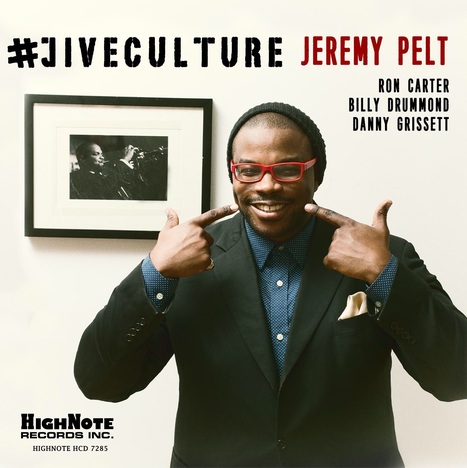 Jeremy Pelt Jive Culture
Jeremy Pelt Jive Culture
High Note
Recorded last September, released in the States in January and finally available here, but by now, Pelt will have been back in Brooklyn’s Systems Two studio making his 2017 CD. Jive Culture is surely his most important album so far and confirms this reviewer’s opinion that, despite the number of excellent players around, Pelt is the most creative trumpeter on the scene today. And this is no ordinary quartet. The irrepressible Ron Carter contributes some of his very best work since the Davis Quintet days. You can feel that he knows it’s a special date. Billy Drummond, who in a way was the catalyst for the recording, plays a very important role in the session, with hard-hitting but sensitive, intuitive fills, which urge Pelt to play so emotively, and he helps to build the tension and unexpected climaxes of the performances. Danny Grissett is arguably the most sympathetic pianist for Pelt’s compositions. The least well-known member of the group, he is inspired by the occasion and comes up with stimulating solos and encouraging comping throughout.
Pelt brought in five new originals, some relatively simple, others with much greater depth. The former include the opener ‘Baswald’s Place’, ‘Akua’ and Carter’s tune ‘Einbahnstrasse’. The latter, later in the CD, are probably the standouts – ‘The Haunting’, the brilliant ‘Rhapsody’ and the closing, restless ‘Desire’. The two remaining tracks are unhackneyed standards – Cole Porter’s ‘Dream Dancing’ (the arrangement of which almost sounds like a Pelt original) and Jeremy’s ballad feature, ‘A Love Like Ours’, played, as always, with heart-breaking tenderness. This is a brilliant record with four outstanding performances. Tony Hall
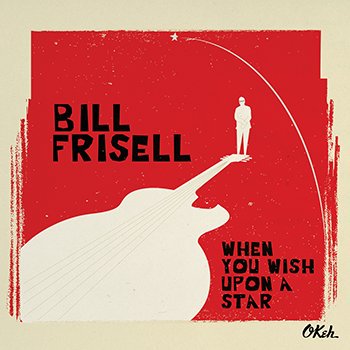 Bill Frisell When You Wish Upon A Star
Bill Frisell When You Wish Upon A Star
Okeh
As with his previous 2014 release Guitar in the Space Age, Bill Frisell continues to mine 1950s-60s popular music culture for inspiration on his new recording for OKeh, the recently revamped Sony imprint. This time though he brings his inimitable signature to film and TV themes predominantly from the same era. His band is the guitar trio which recorded Beautiful Dreamers in 2008, with the addition of the distinctive Thomas Morgan on bass and sometime collaborator Petra Haden on vocals. The strongest selections are the suite-like arrangements of themes including Elmer Bernstein’s haunting ‘To Kill a Mockingbird’ which is given a country and folk-rock music makeover with Frisell and viola player Eyvind Kang setting it off beautifully. ‘Fairwell to Cheyenne’ gives Ennio Morricone a reggae-ish twist and the themes from Psycho benefit from some Frisellian humour. Petra Haden sings wordless vocal on Morricone’s ‘Once Upon a Time in the West’, and the lyrics of title themes such as ‘You Only Live Twice’, ‘Moon River’ and the album’s title track, songs that are by now over-familiar are refreshed somewhat with a dry sentimentality and a vocal that’s tuned sensitively to Frisell’s arrangements. It’s a beautifully-sculpted chamber strings soundscape and the guitarist’s artfully layered, soulful mesh of overtones, rockabilly twang and other effects he’s made his own comes with his usual impeccable taste. Selwyn Harris
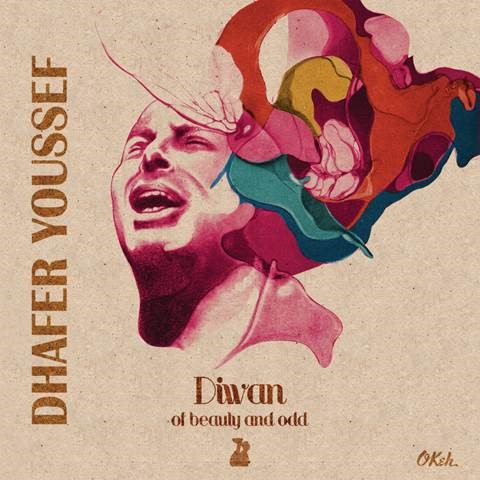 Dhafer Youssef Diwan of Beauty and Odd
Dhafer Youssef Diwan of Beauty and Odd
OKeh
Tunisian oud player-singer Youssef has proved two things over the best part of two decades: that, firstly, he, like the best bandleaders, can assemble the most effective, often international collaborators, and secondly, his overall creative drive remains undimmed. There is some significance to be read into the cultural identity of this latest project insofar as it is very much ‘the New York’ album, defined by the presence of a quartet that represents the riches of that city’s jazz scene in no uncertain terms. Yet the overarching conceptual premise of the album – compositions of haunting lyricism within the framework of relatively unusual time signatures – is sufficiently strong to make you question exactly what a New York combo is supposed to sound like. Williams, Guiliana, Parks and Akinmusire play with the kind of pin-drop delicacy that one might associate with classical musicians at various points on the set, crafting ambiences that are cinematic in shadow play and understatement. But they also kick robustly on the higher tempos, locking into the wavering beats so organically as to make the uneven numbers ‘felt’ as much as they are heard. As good as the band is, and as skillfully as the arrangements uphold an evolutionary line from Moorish to Spanish music to an undefined space that acknowledges both ambient electronica and soundtracks, Youssef’s immense personality is well to the fore. His oud playing has a stark rhythmic drive that is offset by the majestic, aerial quality of his voice, and it is a combination that pays dividends on this affecting set of songs. Kevin Le Gendre
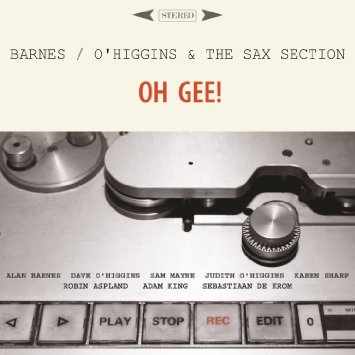 Barnes/O’Higgins & The Sax Section Oh Gee!
Barnes/O’Higgins & The Sax Section Oh Gee!
Woodville
The onrush of Barnes on record continues, as does the flow of releases on his Woodville label. Having heard this ensemble excel at last year’s Swanage festival, it’s easy to understand why he felt it should be recorded. The co-leaders are form players in any situation and each contributed charts to this five-sax group, reworking a mixture of classic pieces by Benny Carter, Edgar Battle, Tadd Dameron and Ellington et al, with just a single Barnes original among the 10 performances.
There’s spirit aplenty in the up-tempo opener, Carter’s ‘Doozy’, wherein the band replicates the composer’s original sax section writing and is notable here for King’s pulsing line and De Krom’s spring-heeled drumming. ‘The End of A Love Affair’ showcases the full section’s ease in tackling a complex arrangement, five breathing as one, AB’s alto the first to emerge, with Mayne, spikier, before Sharp bustles in on baritone. Mr and Mrs O’Higgins show up pretty well too as each plays chase with Barnes and Mayne. There’s a sense throughout of everyone up on their toes for this session, the section blend spot-on, as is their collective articulation, everyone soloing ably and at will, with this rhythm section daring them not to swing. A note too for Aspland, another player who knows how to rise to the occasion, always anxious to add value.
Just to hear this gang play their version of Dexter Gordon’s solo on ‘The Chase’, fast-moving and lapel-grabbing is a joy, as is their ‘reduction’ of Ellington’s celebrated ‘Ko-Ko’ chart, with Sharp echoing Carney’s time-honoured line and Barnes’ limpid clarinet snaking in and around the harmonies. Listen and expect to be bowled over. Peter Vacher
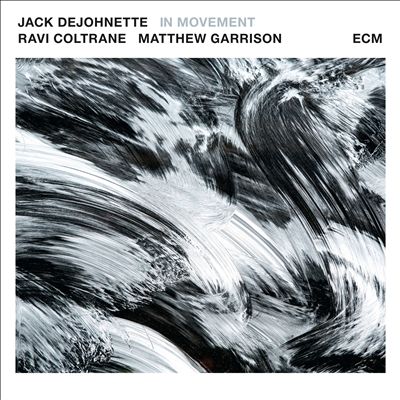 Jack DeJohnette/Ravi Coltrane/Matthew Garrison In Movement
Jack DeJohnette/Ravi Coltrane/Matthew Garrison In Movement
ECM
Despite the size of Jack DeJohnette’s discography, it is probably fair to say the drummer’s best recordings under his own name are to be found on the ECM label. In Movement sees his return to the label with two younger musicians whom he has known since their childhood. The leading voice in the proceedings is saxophonist Ravi Coltrane, whose playing here must surely be his finest on record. In an album of free and structured improvisation and group interaction, he makes light of the creative burden this trio context demands.
‘Rashied’, with DeJohnette and Coltrane in duo, is an album highlight inspired by Rashied Ali’s duets on Interstellar Space with Ravi’s father John. It also provides a leitmotif for an album of fascinating musical movement where sounds and styles are freely mixed, developed and exchanged, abruptly morphing into new shapes and directions. Garrison excels on bass – in dialogue with the saxophone, in dialogue with the drums – and exploiting electronics to create sometimes trippy, sometimes colouristic episodes which add unexpected tonal contrasts within the trio format. Stuart Nicholson
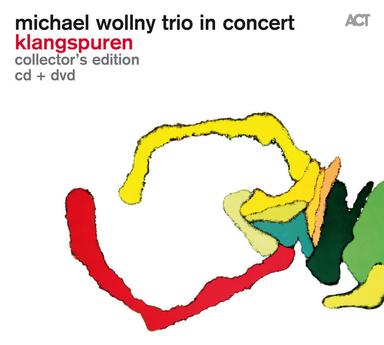 Michael Wollny Trio Klangspuren
Michael Wollny Trio Klangspuren
ACT
Wollny’s growth as an artist on record has been fascinating to follow and while not all his projects have yielded 50 carat gems it’s only in the doing that an artist discovers a little more of himself, including his or her strengths and weaknesses. It’s how an artist’s vision is shaped.
In Wollny’s case, aspects of his musical personality seem to be coalescing very quickly, and with it the realisation the piano trio is the best forum to focus his talent. At the end of October 2015 Wollny’s trio embarked on a Karsten Jahnke Jazz Nights tour of 14 German cities. It prompted the German broadsheet Süddeutche Zeitung to announce, “Wollny’s off on tour. Just get yourself there. Awesome!” More than 10,000 people took that advice, and the final night of that tour is captured on the CD of this CD/DVD release. Recorded on 13 November 2015, it shows how much has stayed the same in Wollny’s fast maturing approach and what is different.
The awe-inspiring head-banging performances that defined his group [em] are there to be drawn upon – and often are, to dramatic effect – but so too is a more carefully calibrated emotional range that values slow tempi, thoughtful, restrained moods and melodic development. He had to go out into the dark (Wunderkammer from 2009) to arrive at this point – but now there is an arc to his improvisations (and the presentation of this concert) that speak of continuing artistic growth – the development of the lyrical aspect of his musical personality and greater awareness of managing inside/outside, dissonance/consonance and polytonality and polyrhythmic playing to specific aesthetic effect that suggest he is well on his way to redefining the piano trio.
The concert draws most of its repertoire from Weltentraum (2014) and Nachtfahrten (2015), but the versions here have an ease of execution that define Wollny’s accomplishments in a trio context. New bassist Christian Weber (who made his first appearance on record with the trio on Nachtfahrten from August 2015) has integrated and assimilated himself into this group in a way that his American predecessor never quite achieved and deserves credit, together with the consistently excellent Eric Schaeffer, for their contributions to a quite exceptional album. The DVD comes from a performance at the Leverkusener Jazztage on 11 November 2014, and here Weber’s contribution can more accurately be measured by comparing his playing to that of Tim Lefebvre on bass on Weltrentraum Live – Philharmonie Berlin that calls on a very similar repertoire. It’s almost as if Weber’s meant to be in the band. Highlights here are ‘Phlegma Phighter’ (a Schaefer original that audiences love in its stirring complexity and impressive execution) and ‘Little Person’ that allows the Romanticist in Wollny to surface. Stuart Nicholson